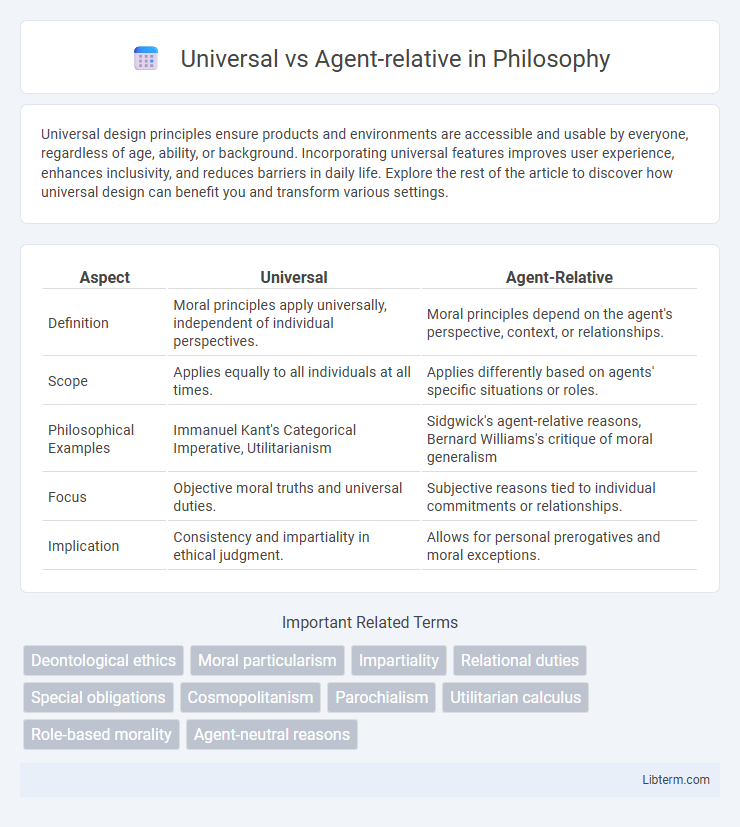Universal design principles ensure products and environments are accessible and usable by everyone, regardless of age, ability, or background. Incorporating universal features improves user experience, enhances inclusivity, and reduces barriers in daily life. Explore the rest of the article to discover how universal design can benefit you and transform various settings.
Table of Comparison
| Aspect | Universal | Agent-Relative |
|---|---|---|
| Definition | Moral principles apply universally, independent of individual perspectives. | Moral principles depend on the agent's perspective, context, or relationships. |
| Scope | Applies equally to all individuals at all times. | Applies differently based on agents' specific situations or roles. |
| Philosophical Examples | Immanuel Kant's Categorical Imperative, Utilitarianism | Sidgwick's agent-relative reasons, Bernard Williams's critique of moral generalism |
| Focus | Objective moral truths and universal duties. | Subjective reasons tied to individual commitments or relationships. |
| Implication | Consistency and impartiality in ethical judgment. | Allows for personal prerogatives and moral exceptions. |
Understanding Universal and Agent-relative Perspectives
Understanding universal and agent-relative perspectives involves recognizing how moral or epistemic principles apply across different contexts. Universal perspectives assert that certain truths or ethical standards hold independently of any individual's beliefs or situations, emphasizing objectivity and consistency. Agent-relative perspectives, in contrast, prioritize the unique standpoint, intentions, or relationships of a particular agent, allowing for context-dependent judgments grounded in personal or situational factors.
Defining Universal Morality
Universal morality asserts that ethical principles apply to all individuals regardless of context, emphasizing objective standards such as human rights and justice. Agent-relative morality, by contrast, grounds ethical duties in the specific perspectives or relationships of individuals, highlighting context-dependent obligations like personal loyalty or cultural norms. Defining universal morality involves establishing consistent, impartial criteria that transcend individual circumstances to guide moral judgment globally.
Agent-relative Ethics: An Overview
Agent-relative ethics centers on moral principles that depend on the perspective or commitments of individual agents, highlighting personal obligations and responsibilities that vary by person. This ethical framework contrasts with universal ethics by recognizing that what is morally required can differ based on an agent's specific relationships, roles, or projects. Key concepts include partiality and personal value, which influence decision-making in situations where self-interest or attachments guide ethical choices.
Key Differences Between Universal and Agent-relative Approaches
Universal approaches apply moral principles and rules consistently across all individuals regardless of personal perspectives, emphasizing objective ethical standards and impartiality. Agent-relative approaches prioritize the specific interests, duties, or rights of the individual agent, acknowledging that moral obligations can vary depending on the agent's particular circumstances or relationships. This fundamental distinction reflects whether ethical judgments are made from a universal viewpoint or tailored to the agent's unique standpoint.
Philosophical Foundations of Universalism
Universalism in philosophy posits that certain moral principles apply universally to all rational beings, transcending individual perspectives or cultural differences. This view contrasts with agent-relative theories, which hold that moral obligations depend on the specific agent's relationships or roles. Universalism emphasizes impartiality and objectivity in ethical reasoning, often rooted in Kantian deontology or utilitarianism.
The Role of Agent-relative Duties in Moral Theory
Agent-relative duties emphasize the moral obligations unique to an individual's perspective, grounding ethical decision-making in personal commitments and relationships. These duties contrast with universal principles that apply uniformly but may overlook the nuances of interpersonal responsibilities and contextual factors. Incorporating agent-relative duties enhances moral theory by addressing the importance of personal integrity and the moral significance of specific agent-centered reasons.
Universal Principles in Practice
Universal principles in practice prioritize consistent ethical standards applicable across all contexts, ensuring fairness and impartiality in decision-making processes. These principles serve as foundational guidelines that transcend individual perspectives, promoting equality and objectivity in evaluating actions and outcomes. Applying universal ethics fosters accountability and supports the development of coherent policies that address complex moral dilemmas effectively.
Challenges to Agent-relative Reasoning
Agent-relative reasoning faces challenges such as conflicts between personal obligations and universal moral principles, creating dilemmas where agents must prioritize their commitments. These challenges highlight the difficulty in balancing subjective perspectives with objective ethical standards, often complicating decision-making processes. Resolving tensions between agent-relative duties and universal claims demands sophisticated frameworks to navigate moral pluralism effectively.
Real-world Examples: Universal vs Agent-relative Ethics
Universal ethics applies consistent moral principles across all situations, such as the prohibition of theft regardless of circumstance. Agent-relative ethics allows moral duties to vary based on personal relationships or roles, like prioritizing the well-being of family members over strangers in emergencies. Real-world examples include whistleblowing laws enforcing universal honesty standards, contrasted with professional codes of conduct that emphasize agent-relative loyalty to clients.
Implications for Law, Policy, and Society
Universal principles provide a consistent framework for law and policy, ensuring equal rights and protections across all individuals regardless of context. Agent-relative considerations introduce flexibility, allowing laws to account for specific circumstances, intentions, or relationships that affect moral and legal responsibilities. Balancing universal norms with agent-relative factors can create more nuanced and effective legal systems, but risks inconsistency and challenges in enforcement, impacting social cohesion and justice outcomes.
Universal Infographic

 libterm.com
libterm.com